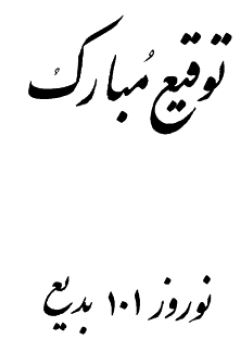
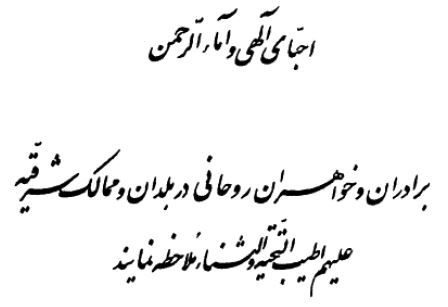
THE CLAIMS AND TITLES OF BAHA'-ALLAH WITHIN THE LAWH-I QARN (CENTENNIAL TABLET [1844-1944]) FOR THE BAHA'IS OF THE EAST, NAW-RUZ 101 BE.
Stephen Lambden UCMerced.
In progress and being revised and corrected - Last Uploaded 21-09-2022.
Some further, important titles and expressions of the status and power of Baha'-Allah, were set forth by the Baha'i Guardian , vali-yi amr Allah, Shoghi Effendi Rabbani (d. London, 1957) in his Persian and Arabic shorter version of his 1944 English 'God Passes By'. It is known as the Lawh-i qarn, `Centennial Tablet' or the `Tablet of the Naw-Ruz, the New Year one hundred and one' of the Badi` or Baha'i era (1260/1844 + 101) = 1944-5). A few printings of this theologically important Persian, almost 200 page text, are as follows:
- Lawh-i qarn-i ahibbā-yi sharq. 1st ed.
- Lawh-i qarn-i ahibbā-yi sharq. Reprint, later edition 123 Badi`/1967-8.
- توقىعات مبارکه حضرت ولى امر الله : لوح قرن احبأ شرق : نوروز 101 بدىع = Tawqīʻāt-i mubāraka-i Ḥadrat-i Valī-yi Amr Allāh : lawḥ-i qarn-i aḥibbā-ʹi sharq : nawrūz 101 Badīʻ. [Tehran] : Muʼassasat-i Millī-yi Maṭbūʻāt-i Amrī, 123 Badīʻ /1966 or 1967. 197, 49 pages.
- Tawqīʻāt-i mubārakah-i Ḥadrat-i Valī Amr-Allāh. [Tehran]: Muʼassasah-i Millī-yi Maṭbūʻāt-i Amrī, 19XX.
- Tawqi`at-i Mubaraka-i Hadrat-i Valī-yi Amr-Allāh khitab bih ahibba-yi sharq. Hofheim-Langenhain: Baha'i-Verlag, 1992.
- Tawqīʻāt-i mubāraka : Khiṭāb bi-aḥibbā-i sharq. Lānginʹhāyn : Lajnah-ʼi Millī-i Nashr-i Āthār-i Amrī bih Lisān-i Fārsī va ʻArabī, 149 BE/ Badi` 1992. This 623 page volume contains the 101 letter, the Lawh-i Qarn as item 4 on pages 75-272.
- Tawqi`at-i Mubaraka Nawruz 101 Badi` min al-athar al-farsiyya li-hadrat Vali-yi Amr-Allah Shawqi Effendi. Trans. `Abd al-Husayn Fikri. Dar al-Badi` li'l-Taba`at wa'l-Nashr. Beirut: 2007.
- PDf.
As noted above, major titles of Baha'-Allah are also set down by Shoghi Effendi in his the Lawh-i qarn-i ahibbā-yi sharq (Centennial Tablet to the Beloved Ones [Baha'is] of the East' written shortly after the English God Passes By. The titles in the New Yesr 101 BE /1944-5 Lawh-i qarn will now be listed and briefly commented upon. The parallels with the titles listed in the English God Passes By will be noted and cross-referenced. Occasional reference will also be made to the commentray on this shorter letter by the Persian Baha'i scholar ʻAbd al-Ḥamīd Ishrāq Khāvarī (d. 197X) in his quite lengthy, two volume Rahiq-i makhtum ("The Choice Wine") published in Tehran in 130-1 BE (Badi`) or 1974-5 CE.
THE LAWH-I QARN
The opening prolegomenon or initial paragraph of the Lawh-i qarn, commences with an address to the Baha'is of the East and offers praise and salutation unto God, registering a succession of His Powers, Purposes, Names and Attributes. It is here that God as the indirectly personal yet Ultimate, the apophatic Divinity beyond, is celebrated. Many of the titles and attributes here relating to God Himself are though claimed by Baha'-Allah as his representative or applied by Baha'is to the founder of their religion.
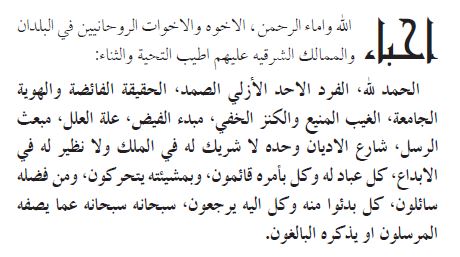
[To] The beloved of God (ahibba Allah) and the maidservants of the All-Merciful (ama' al-rahman), spiritual brothers and sisters in the countries and the eastern dominions, upon them be blessing, laudation and praise,
Praise be unto God, the Unique (al-fard), the One (al-ahad), the Eternal (al-azal), the Perpetual (al-samad), the Grace-Diffusing Realitu (al-haqiqa al-fa'ida) [or the Bestower of Grace (al-fa'ida)], the Universal Divine Ipseity (al-huwiyya al-jami`at), the Hidden (al-ghayb), the Inaccessible (al-mani`), the Hidden Treasure (al-kanz al-khafi), the Source of the Divine Bounty (mabda' al-fayd), the Cause of Causes (`illat al-`ilal), the Comissioner of the Sent Messengers (mab`ath al-rusul), the Legislator of the Religions (shari` al-adyan), the One about Whom there is no doubt throughout the dominion (al-mulk), the One Who cannot even be glimpsed within the sphere of creation (al-ibda`), all are His servants (`ibad) and all abide by His bidding (bi-amrihi qa'imun). By virtue of His Will (mashiyyat) is everything set in motion. On account of His Bounty (fadl) do all make enquiry. All originate from Him and all return unto Him. So Glorified, Glorified be He Who is beyond whatsoever the sent-Messengers (al-mursalun) disclose or whatsoevever may be mentioned by souls profound.
Titles of Baha'-Allah in the Lawh-i qarn.
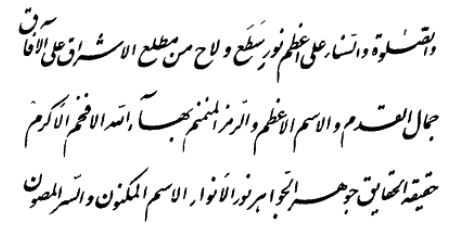
From the 1992 German printing of the Lawh-i qarn (p.76).

From the Beirut 2007 Arabic edition of the Lawh-i qarn (p.5).
[The Titles of Baha'-Allah Part IA]
[1] The Most Great Light (a`zam nur).
Cf. also GPB No.X.The second paragraph opens when Shoghi Effendi offers "Salutations and laudation" upon Baha'-Allah as the "Most Great Light" ' the supernal "Light" which is then described by Shoghi Effenndi as being one that "glistens and radiates forth from the dawning-place of the Radiance (matla` al-ishraq) beyond the Horizons (al-ufaq)".
[2] The Ancient Beauty (jamal al-qidam).
Also GPB No.X .
[3] The Greatest Name (al-ism al-a`zam).
Also GPB No.X .
[4] The Ornamented Symbol (al-ramz al-munamnam).
The word ramz meaning intimation, cipher, symbol, emblem, etc in this genitive title is an important word in Islamic mysticism, esoterica, codicology, numerology and other dimensions of the `ulum al-ghayb. It is found in important contexts in recondite Shaykhi gnosis.
The phrase ramz al-ra'is li-sirr al-tankis (The symbol of the Ruler pertaining to the Mystery of Inversion) was used by Shaykh Ahmad al-Ahsa'i in certain important treatises. It thus also occurs in the c. 1873 CE al-kitab al-aqdas (per. kitab-i aqdas) of Baha'-Allah where it is cited and commented upon. It has to do with the exegesis of the inverted Arabic letter "W" = as it is found in the graphical Shi`i form of the al-ism al-a`zam (Mightiest Name"). This "w" or waw when spelled out in full has three letters (w+a+w) which have abjad numerical values of 6+1+6. Each of the three letters is interpreted by Baha'-Allah, `Abd al-Baha' and others in fascinating ways, especially as the "w" indictes an eschatological reversal of faith status- the letter w is inverted or turned upside-down.
In his Tablet to the Templar leader Georg David Hardegg (1812–1879), the Lawh-i Hartik [Hirtik], Baha'-Allah refers to the ramz al-ra'is (cypher-symbol of the ruler) in the following section :
O beloved one! Behold "the mystery of reversal on account of the symbol of the Ruler" for He hath made their exalted ones their lowly ones and their lowly ones their exalted ones.
The Arabic word al-munamnam appears to be a quadriliteral (4 letter based ) word, the root being the n-m-n-m. Its verbal form is namnama and has connotations of streaking or stripes, hence also, it can indicate `to adorn, embellish, ornament' (see Lane, Lexicon, XXX ; Hans Wehr, Dictionary 1974 3rd printing, p. 1001).
The title al-ramz al-munamnam ("The Ornamented Symbol") occurs in a quite lengthy list of elevated and often rhyming titles of the Bab [and /or Baha'-Allah] contained in the Baha'-Allah-Khadim-Allah, Persian, anti-Azali (c. 1867) book, the Kitab-i Badi` ("The Wondrous Book", ed. Zero Palm Press, 148 BE/ 1992, p.44; ed. 2008:21). An extract from this important list of titles of the Bab [and/or Baha'-Allah] titles reads as follows:
هو ربّ الاعلی و سدرة المنتهیوشجرة القصوی و ملكوت العلی و جبروت العماء و لاهوت البقا و روح البها و سرّ الاعظم و كلمة الاتمّ و مظهر القدم و هيكل الاكرم و رمز المنمنم و ربّ الامم و البحر الملتطم و كلمة العليا و درّة الاولی و صحيفة المكنون و كتاب المخزون جمال الاحديّه و مظهر الهويّة و مطلع الصمديّة ...
"He [the Bab] is indeed is the rabb al-a`la (The Most Transcendent Lord), the Sidrat al-Muntaha ("Tree of the Extremity"), the shajarat al-quswa ("Tree of the Ultimacy"), the malakut al-`aliyy (The Elevated Kingdom"), the jabarut al-`ama' ("Omnipotant Realm of the Theophanic Cloud"), the lahut al-baqa' ("The Divine Real of All-Eternit"), the ruh al-Baha' ("The Spirit of Splendour"), the sirr al-a`zam ("The Most Great Mystery"), the kalimat al-ummam ("The Word of all Nations"), the mazhar al-qidam ("The Pre-Existent Manifestation"), the haykal al-amr ("The Temple of the Cause"), the ramz al-munamnam ("The Ornamented Symbol"), the rabb al-umam ("Lord of All Nations"), bahr al-multatim ("The Surging Ocean"), the kalimat al-`ulya' ("The Most Elevated Word"), the durrat al-awwali ("The Primordial Pearl"), the sahifa al-maknun ("The Hidden Scroll"), the kalimat al-makhzun ("The Treasured Word"), the jamal al-ahadiyya (The Beauty of the Divine Oneness"), the mazhar al-huwiyya ("The Manifestation of the Divine Ipseity") matla` al-samadiyya ("The Dawning-Place of the All-Perpetual") ... (K-Badi`, 43-44; ed. 2008:21).
[5] The Splendor/Glory of God, Baha'-Allah,
Cf. GPB No.X .The following two superlatives are here associated with the person or title Baha'-Allah, [1] al-afkham (the superlative form of f-kh-m) meaning, `the most magnificent-stately-imposing' and [2] al-akram (the superlative form of k-r-m) indicating `the most noble-`the most munificent' or`the most perfect'.
[6] The Reality of Realities (haqiqat al-haqa'iq).
[7] The Essence of Essences (jawhar al-jawahir).
[8] The Light of Lights (nur al-anwar).
[9] The Hidden Name (al-ism al-maknun).
[10] The Secreted Mystery (al-sirr al-masun).
Since the Arabic word sirr is often translated secret or mystery and masun indicates something well-guarded or secreted we have offered the translation "The Secreted Mystery" though "Well-Guarded Mystery or the like would also be
[11] The Ancient Root (al-asl al-qadim).
[12] The Great Announcement (al-naba' al-`azim).
![]()
The third Ṭaráz
concerneth good character. A good character is, verily, the best mantle for men from God.With it He adorneth the temples of His loved ones. By My life! The light of a good character surpasseth the light of the sun and the radiance thereof. Whoso attaineth unto it is accounted as a jewel among men. The glory and the upliftment of the world must needs depend upon it. A goodly character is a means whereby men are guided to the Straight Path and are led to the Great Announcement. Well is it with him who is adorned with the saintly attributes and character of the Concourse on High (TBAA: XX). .
[13] The Divine Universal Manifestation (al-mazhar al-kulli al-ilahi).
[The Titles of Baha'-Allah Part IB]
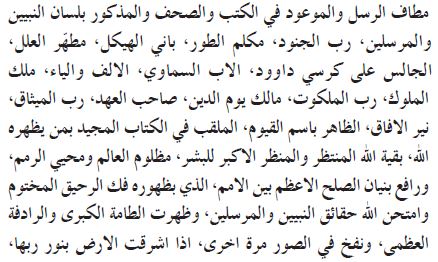

[14] The Point of Circumambulation of the Messengers (al-mataf al-rusul).
[15] The Promised One (al-maw`ud) who hath been mentioned in the books and the scrolls (al-suhuf).
[16] The One Mentioned (al-madhkur) by the tongue of the prophets (al-nabbiyun) and the Messengers (al-mursalin).
[17] The Lord of Hosts (rabb al-junud),
"Lord", "Lord of Lords" and "Lord of Hosts" are all titles associated with the high theophanological claims of Baha'-Allah when addressed to Jews and others. There are often important biblical and Islamo-biblical roots behind these titles. In scriptural Tablets to Jews and others Baha-Allah claimed to be the tetragrammaton YHWH who conversed with Moses on Sinai.
The Face of the Ancient One [Bahā'u'llāh] hath turned towards the sages (ḥukamā') in the Land of al-hā' and al-mīm [Hamādān, in [158] Iran] and announceth unto them the glad-tidings of the Riḍvān (Paradise) of God, the Lord of all the worlds: "By God! He Who hath been named YHWH "Jehovah" in the Torah hath come ( text in AQA, Vol. 2, p. 28; trans. Shoghi Effendi, cited in The Dispensation of Bahā'u'llāh, p. 13 (adapted).
On similar lines is the following extract from an epistle of Bahā'u'llāh to the Bahā’ī poet `Andalīb (and others), "He [Bahā'u'llāh] it is Who, in the Old Testament (Torah) hath been named YHWH "Jehovah" (text in AQA 2:7).
A good many passages are to be found in the Tablets of the late West Galilean (`Akkā) period in which Bahā'u'llāh refers to himself as "the Lord (YHWH) of hosts" (Arabic: rabb al-junūd). One such passage reads as follows:
This is the Day in which He Who cried out on the Mount (munādī al-ṭūr) hath held converse and the Lord of Hosts (rabb al-junūd) proclaimed before all the world: "No God is there except Me, the Mighty, the Knowing".
`Abdu'l-Bahā specifically identified the Biblical "Lord of Hosts" with his father and spoke of the "hosts" as the stalwart members of the Bahā’ī community. 269 (see `Abdu'l-Bahā, Tablets of the Divine Plan, pp. 17-23; Letter of `Abdu'l-Bahā, dated April 19, 20, and 22, 1916).
[18] The Speaker on the Mount (mukallim al-tur)
[19] The Builder of the Temple (bani al-haykal)
[20] The Healer of Infirmities (al-muttahir al-`ilal)
[21] The One seated upon the Throne of David (al-jalis `ala kursi dawud)
[22] The Heavenly Father (al-ab al-samawi)
[23] The Alpha and the Omega (al-alif wa'l-ya').
The title the "Alpha and Omega," is found of the divine Jesus Christ in the prologue or commencement of the Apocalypse of John of Patmos or Book of Revealtion which purports to be a revelation from the enthroned and exalted post-resurrection Jesus Christ. The Greek text at Rev. 1:8 with the 1611 AV-KJV translation are as follows:
Ἐγώ εἰμι τὸ Ἄλφα καὶ τὸ Ὦ, λέγει Κύριος ὁ Θεός, ὁ ὢν καὶ ὁ ἦν καὶ ὁ ἐρχόμενος, ὁ Παντοκράτωρ.
AV - KJV Trans. Rev. 1:7-8.
7 Behold, he cometh with clouds; and every eye shall see him, and they also which pierced him: and all kindreds of the earth shall wail because of him. Even so, Amen.
8 I am Alpha and Omega ( τὸ Ἄλφα καὶ τὸ Ὦ, ), the beginning and the ending, saith the Lord, which is, and which was, and which is to come, the Almighty.
Baha;-Allah himself has referred to himself in a number of his scriptural Tablets as the "Alpha and th Omega" which he cites in the Arabic version,
Drawing heavily on the New Testament Apocalypse, `Abd al-Baha' has written:
"O ye beloved of God! O ye children of His Kingdom! Verily, verily, the new heaven and the new earth are come. The holy City, New Jerusalem, hath come down from on high in the form of a maid of heaven, veiled, beauteous, and unique, and prepared for reunion with her lovers on earth
He hath wiped away their tears [Rev. 21:4], kindled their light, rejoiced their hearts and enraptured their souls. Death shall no more overtake them neither shall sorrow, weeping or tribulation afflict them. The Lord God Omnipotent hath been enthroned in His Kingdom and hath made all things new [Rev. 21:5] This is the truth and what truth can be greater than that announced by the Revelation of St. John the Divine?
He is Alpha and Omega [Rev. 1:8]. He is the One that will give unto him that is athirst of the fountain of the water of life and bestow upon the sick the remedy of true salvation. He whom such grace aideth is verily he that receiveth the most glorious heritage from the Prophets of God and His holy ones. The Lord will be his God, and he His dearly‑beloved son" (`Abdu'l‑Baha' Selections from the writings of `Abdu'l‑Baha, trans. 12‑13)
[24] The King of Kings (malik al-muluk).
In his English God Passes By, Shoghi Effendi observes,
"To the kings of the earth, both in the East and in the West, both Christian and Muslim ... on the very night of the Declaration of His Mission, Bahá’u’lláh, during the darkest days of His confinement in ‘Akká, addressed some of the noblest passages of His Most Holy Book [Kitab-i aqdas]. In these passages He called upon them to take fast hold of the “Most Great Law”; proclaimed Himself to be “the King of Kings” and “the Desire of all Nations”; declared them to be His “vassals” and “emblems of His sovereignty”; disclaimed any intention of laying hands on their kingdoms; bade them forsake their palaces, and hasten to gain admittance into His Kingdom; extolled the king who would arise to aid His Cause as “the very eye of mankind”; and finally arraigned them for the things which had befallen Him at their hands.
This passage makes it clear that Shoghi Effendi, in referring to Baha'-Allah as the malik al-muluk, the "King of Kings" the following passage in the Kitab-i aqdas was intended:
Ye are but vassals (al-mamalik), O kings of the earth (ma`har al-muluk)!
He Who is the King of Kings (al-malik) hath appeared, arrayed in His most wondrous glory, and is summoning you unto Himself, the Help in Peril, the Self-Subsisting. Take heed lest pride deter you from recognizing the Source of Revelation (mashrik al-zuhur), lest the things of this world shut you out as by a veil from Him Who is the Creator of heaven. Arise, and serve Him Who is the Desire of all nations (al-maqsud), Who hath created you through a word (kalimat) from Him, and ordained you to be, for all time, the emblems of His sovereignty" *Kitab-i Aqdas, Para. 82, p. 79; trans. Para. 82 p.49).
Other references to this title include:
Lawh-i Burhan : "This is the day whereon every man endued with perception hath discovered the fragrance of the breeze of the All-Merciful in the world of creation, and every man of insight hath hastened unto the living waters of the mercy of His Lord, the King of Kings (malik al-muluk)." (Lawh-i Burhan: MAM:64; trans. TBAA: 214-5).
[25] The Lord of the Kingdom (rabb al-malakut).
[26] The King of the Day of Judgement (malik yawm al-din).
This elevated title of Baha'-Allah seems to be derived from the Surat al-Fatihah (The Surah of the Opening) of the Qur'an, the fourth verse of which reads :

The context as as follows :
In the Name of God, the Merciful, the Compassionate.
[2] Praised be to God, Lord of all the worlds. [3] The Merciful, the Compassionate [4] The King of the Day of Judgement (lit. Religion, malik yawn al-din). [5] Thee do we worship and unto thee do we cry for help. [6] Guide us unto the Straight Path. [7] The path of those upon whom Thou hast bestowed favor, not of those who have evoked [Thy] wrath or of those that have gone astray."
[27] The Master of the Covenant (sahib al-`ahd).
[28] The Lord of the Testament (rabb al-mithaq).
[29] The Brightness of the Horizons (nayyir al-afaq).
[30] The One Evident with the Name of al-Qayyum (the [Deity] Self-Subsisting").
[31] The One Entitled in the Glorious Book (al-kitab al-majid) as Man Yuzhiru-hu Allah ("Him whom God shall make manifest").
[32] The Promised Remnant of God (baqiyyat-Allah al-muntazar).
بَقِيَّتُ اللَّهِ
In Imami sources the imamological and messianic title Baqiyyat-Allāh ([Imamological] Remnant of God) is grounded in a non-literal interpretation of the initial portion of a verse of the Qur’ānic Surat Hūd:

“The Baqiyyat-Allāh is best for you if you are of such as believe” (Q. 11:86a).
Originally words of the prophet Shu`ayb addressed to the Midianites, in Shī`ī sources, these words have fascinating messianic interpretations. Ja`far al-Ṣādiq, for example, in a tradition about the signs of the eschatological age, stated that the Mahdi-Qā’im will declare in Mecca: “I am the Baqiyyat-Allāh, His Caliph (khalīfa) and His Ḥujjat (messianic Proof) unto you.’ And no Muslim will utter peace and blessings upon him (the taslīm) but he will say: `Peace be upon you, O Baqiyyat-Allāh upon earth’.” This tradition is also partially cited from the from the 5th Imam Muhammad al-Bāqir in, for example, Fayḍ al-Kāshānī, Tafsīr al-ṣāfi vol. 2: 206 (on Q. 11:86); Huwayzī, Tafsīr nūr al-thaqalayn vol. 2: 212 (on Q. 11:86). See further Majlisi, Bihār al-anwār, vol. 51: 36; 59: 36, 145.
This gives the title Baqiyyat-Allāh clear messianic implications. It is an Imamī title registered in the al-Ziyāra al-jāmi'a al-kabīra and has been given complex imamological and other levels of interpretation in the Sharḥ al-Ziyāra al-jāmi'a al-kabīra of Shaykh Aḥmad al-Aḥsā’ī (see Sh-Ziyāra, III: 246-252). The following tradition attributed to Imam `Alī is cited by Huwayzī in his Tafsīr nūr al-thaqalayn (on Q.11) from the Kitāb al-Iḥtijāj (Book of Disputation) of `Alī al-Ṭabrīzī [Ṭabarsī] (d. c. 548/1153):
He made mention of the Ḥujaj (Proofs) at which he [Imam `Alī] stated, `They are the Baqiyyat-Allāh, meaning the Mahdī. He will come nigh the expiration of this time [period] (`ind al-inqiḍā’)… He will fill the earth with the anticipated justice and equity (qisṭ an `adl an) just as it is now filled with tyranny and oppression (jawr an ẓulm an) (cited Huwayzī, Tafsīr on Q.1 = Ḥuwayzī, Tafsīr nūr al-thaqalayn vol. 2:212 (on Q. 11:86). See further Majlisī, Bihār al-anwār, vol. 51: 36; 59: 36, 145.).
A tradition exists from Imam Ja`far al-Ṣādiq in which he predicts the succession of the twelve Imams and describes the last of them as al-qā’im bi’l-ḥaqq (The Qā’im who will arise with Truth), the Baqiyyat-Allāh on His earth, the master of time (ṣāḥib al-zamān) and the leader or caliph (of the All-Merciful (khalifat al-raḥmān)”. This tradition of the 6th Imam Ṣādiq is contained in Ibn Bābawayh’s Ikmāl al-dīn from which it is also cited in the Bihar al-anwār of Majlisī, 2nd ed. vol. 59, p.145.
In the early writings of the Bāb, the title Baqiyyat-Allāh (like the synonymous Dhikr-Allāh, Remembrance of God) is quite frequently indicative of the messianic Imam who is the remnant of the legacy of the Shī`ī Imamate. For the Bāb, these terms indicate celestial figures on whose behalf he reveals verses expressive of eschatological divine guidance. It was thus appropriate for him to associate Baqiyyat-Allah Islamic traditions with his claim expressed in the new adhān. one version of which is set forth in his 1845 Khasa'il-i sab`a.
A footnote of Shoghi Effendi to his Dawn-Breaker’s version of the new 1845 adhān of the Bab spelled out in his Khasa'il-i sab`a (The Seven Directives), understands Baqiyyat-Allāh to be a “Reference to Bahá’u’lláh”. This must be viewed as a later Bahā’ī theological position supplememtary to this title being a standard Shi`ī designation of the Hidden Imam and a title claimed by the Bab in many of his writings.
Like the Bab and / or the hidden messianic twelver Imam, Baha'-Allah also claimed to be the Dhikr Allah in paragraph 185 of his Most Holy Book :
"This is the Counsel of God (nush Allah); would that thou mightest heed it! This is the Bounty of God (fadl Allah); would that thou mightest receive it! This is the Utterance [Remembrance] of God (dhikr Allah); if only thou wouldst apprehend it! This is the Treasure of God (kanz Allah); if only thou couldst understand!"(Kitab-i aqdas Para 185 p.177 trans. 1992 p. 87).
[33] The Greatest Panorama (al-manzar al-akbar) for humankind (li'l-bashar).
[34] The Wronged One of the World (mazlum al-`alam).
[35] The Quickener of Mouldering Bones (muhya al-rama[i]m).
[36] The Upholder of the citadels (rafi` al-bunyan) of the Most Great Peace (al-sulh al-a`zam) among the Nations (al-umam).
[37] The One through whose Manifestation the Choice Wine (al-rahiq al-makhtum) hath been unsealed.
[38] The One through whom God hath tested the realities of the prophets and the Messengers (haqa'iq al-nabbiyin wa'l-mursalin).
[39] The One who hath actualized the Supreme Catastrophe (al-tamma al-kubra) and the Mighty Advent (radifa al-`uzma).
[40] The One who hath sounded the Trumpet (nafakha al-sur) a subsequent time, when the earth shone forth through the Light (nur) of its Lord (rabb), when its tidings (akhbar) were disclosed and its burden (athqal) cast out. So exalted, exalted be His Might (`izz), his Baha' (Glory-Splendor), his Glory (majd), his Transcendence (`ala'), his Sovereignty (sultana), his Omnipotence (jabarut) and his Grandeur (kubriya').
Baha'-Allah is here described as the one who has sounded or blown into the eschatological "trumpet" (nafakha al-sur) a second or subsequent time. The successive or twofold blowing into or sounding of the Trumpet in eschatological times, is predicted a number of times in the Qur'an, as it is in numerous Islamic traditions often rooted in the Bible in in Jewish and/or Christian writings.
In the section on `The blowing into the Trumpet (nafah al-ṣūr) and the annihilation of the world (fanā’ al-dunyā’) in Majlisi’s Biḥār al-anwār2 (VI:316ff) Qur’ān 74:8 is commented upon in the following manner:
“Concerning His saying - exalted be He -- “And when the Trumpet is sounded (ADD” (Q. 74:18); the meaning is `When the Trumpet is blown into (ADD)’ which [Trumpet] resembles the form of the Horn (`Bugle', `Trumpet’; ADD , ka-hay’it al-būq) .And it is said that this is the first blast (`blowing’) [of the Trumpet] which signalizes the commencement of the universal, catastrophic terror (al-shadda al-hā’ila al-`āmma). It is [also] said that upon the second blast [of the Trumpet] God brings to life the creatures [creation] and causes the resurrection to come about” (Biḥār, 6:373).”
Islamic eschatological traditions contain many further details about the various Trumpet blasts of the latter days. The occurrence of ADD nafḥa is quite common in eschatological traditions which make mention of the end-time blowing into the trumpet. In his Risāla al-Qatifiyya, for example, Shaykh Aḥmad responds to a various questions of Shaykh Aḥmad ibn Sāliḥ ibn Tūq al-Qatfī including one about the eschatological “return” (rujū`) unto God. He mentions that God will commission the four (Arch)angels and command Isrāfīl to blow (nafkha) into the Trumpet (al-ṣūr) etc (Ahsa'i, JK 1/2:135).
In certain writings of the Bāb and in a great many of the (later) writings of Bahā’-Allāh there are references to the motif of the eschatological trumpet blast(s) -- which is rooted in Jewish and Christian apocalyptic literature (refer for example, Isaiah 27:13, Zech. 9:14, Targ. Ps. Jon Num 23:21; 1 Thess. 4:16, I Cor 15:52, Rev. 8-11, Matt. 24:31). Particularly interesting in the light of line 6a of the Rashḥ-i `amā’ is the Bāb’s reference in his (Persian?) Ṣaḥīfa-yi `adlīya , to the various signs indicative of the onset of the `last days' including the announcement that ".. the Trumpet hath been sounded in the domain of the [Divine] theophany (`land of Manifestation’; nuqira al-nāqūr fī ard al-ẓuhūr)" (Saḥīfa-yi `adlīya, 4).
At the very outset of his prophetic mission, in the opening of the sixth couplet his early Persian qasida poem (c.1852), the Rashh-i `ama' (The Sprinkling of the Theophanic Cloud), there is clear reference to the blowing into the eschatological trumpet or bugle. Allusion is made to Qur'ān 74:8 which reads:

It is only in this Qur'ānic verse that nāqūr, “theTrumpet/ Bugle” and the passive verbal form, nuqira (= `to be sounded, blown into' - both from the same Arabic root [n-q-r]) occur. Elsewhere in the Qur'ān other Arabic terms are used to indicate the eschatological “Trumpet” (most often ṣūr x 11) or `Trumpet Blasts - whlch herald the onset of the last "Hour", the “resurrection”, “assembling”, “judgement” as well as the meeting or “encounter with God (liqa'-Allah) (see Qur'ān 6:73; 18:99; 20:102; 23:103; 27:89; 36:51; 50:19; 69:13; 78:18 and 39:68 (= twin `trumpet blasts').
"And when the Bugle-Trumpet is sounded!"
Thus, the Rashh-i `ama' reads :
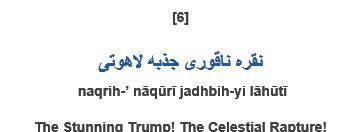

In the opening genitive expression naqrih nāqūrī the initial or governing verbal noun is probably to be read naqrih or naqra and understood to indicate (lit.) "the blowing into the Trumpet (naqrih-' nāqūrī). Bahā'-Allāh here mentions the eschatological Trumpet Blast and the anticipated "Celestial Rapture" (jadhbih-yi lāhūtī) which perhaps indicates the rejoicing in the highest heavenly realm as a result of the eschatological disclosure, the impending latter-day "blast" heralding a new era of fulfillment. The sense here might be that both the "trump" and the "rapture" are concurrently heralded. They rain down or are heard as a single trumpet blast (nafkha ) from the "firmament of Heaven" (jaww al-samā’). As a result of the arrival the Bābī dispensation and the new - though at this time secret messianic claims of Bahā’-Allāh - the eschatological consummation is being announced in the heavenly realms. It may be indicated that the predicted twin eschatological Trumpet Blasts have become one stunning event through the person of Bahā’-Allāh, the “spiritual “return” of the Bāb. The life-giving second “blast” of the “Trumpet” heralding another Bab amnd/or Baha'-Allah centered quickening divine revelation of the Word of God.
Bahā’-Allāh has interpreted the various Qur'ānic texts that mention `Trumpet Blasts' in the light of the advent of the Bāb and his own person, mission and revelation. In his Sūrat al-aḥṣāb (c. 1864), for example, he states:
Say: By God! The greatest Trump (sūr al-akbar) hath been made manifest in this Trumpet (al-nāqūr) which, in very truth, hath cried out. It hath been sounded (nuqira) and will cry out between the heavens and the earth with the most elevated shout... (Ṣūrat al-aḥṣāb in AQA 4:11)
Such passages could be greatly multiplied. There are at least 50-100 passages in Bahā’-Allāh's writings in which the motif of the eschatological Trumpet(s) is utilised to express his eschatological outpouring of divine revelation (wahy).
Concluding Note
Translated by Stephen Lambden from Tawqīʻāt-i mubāraka : Khiṭāb bi-aḥibbā-i sharq. Lānginʹhāyn : Lajnah-ʼi Millī-i Nashr-i Āthār-i Amrī bih Lisān-i Fārsī va ʻArabī, 149 BE/ Badi` 1992, pp. [74] 75-77 also with reference to the Arabic translation of `Abd al-Husayn Fikri, Tawqi`at-i Mubaraka Nawruz 101 Badi` min al-athar al-farsiyya li-hadrat Vali-yi Amr-Allah Shawqi Effendi. Trans. Dar al-Badi` li'l-Taba`at wa'l-Nashr. Beirut: 2007, pp. 5-6. This list of the titles of Baha'-Allah in the Lawh-i qarn is followed by a laudation upon past prophets and Messengers of God collectively, then one upon the Bab, one upon `Abd al-Baha', and several further paragraphs extolling the greatness of the first century of the Babi-Baha'i era (1844-1944). See :
See also the useful annotated translation of
♦



